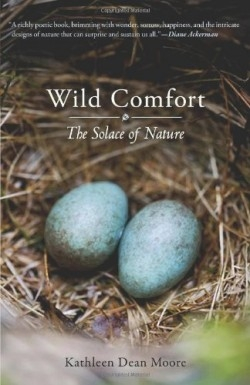Wild Comfort
The Solace of Nature
Introspectives looking for nature writing in the vein of Rachel Carson or Annie Dillard will appreciate Wild Comfort, not only for its sensual imagery, but also for its informative and encouraging tone. Moore, a professor of philosophy at Oregon State University, has fused her experiences in nature and human suffering into true stories. The comfort she finds is not in abstract ideas, but in what is. She takes us from Oregon to Alaska to the Sea of Cortez. We visit a bioluminescent ocean with electric water, take in the stars, and feel our way along a pitch-black night. We burn trash in Alaska. We grieve the passage of friends away from this life, and sit in soggy classrooms that shelter us from a storm. We eat migas in the desert in winter. We learn how to properly relate to stones. From these stories, Moore draws metaphors. For example, she explores the way snakes survive through winter to emerge again. “Find the warm places; do not expect them to come to you. When you find them, stay there and be still. Be still and watchful. In this quiet, taste the air…Listen with the full length of your body against the ground.”
The book’s three main sections (Gladness, Solace, and Courage) provide a rough structure for vignettes of various lengths. Although the locations and lessons change, Moore’s impeccable attention to detail and vivid descriptions invoking all five senses are constant. The book, to the unsuspecting reader, may at first seem like an adventure as told by Moore. Here she sees a fish stolen out of a heron’s throat; there she laments the death of a friend. Indeed, it is an adventure, as we traipse through places we may never visit. However, we come to realize that she has made us look deeper into our own selves as we ask: What is hope? Why must we feel pain? How are we comforted?
The author notes that in writing the book, she did not expect to write about the way nature comforts us in sorrow, but about happiness. In the end, she has managed to show that the two are in fact not mutually exclusive, but tied together through hope. “Hope keeps us alive,” she writes, “even as we move towards inevitable death. This is essential.” The courageous thing is to let go and let nature take its course; life’s treasures will be revealed.
Disclosure: This article is not an endorsement, but a review. The publisher of this book provided free copies of the book to have their book reviewed by a professional reviewer. No fee was paid by the publisher for this review. Foreword Reviews only recommends books that we love. Foreword Magazine, Inc. is disclosing this in accordance with the Federal Trade Commission’s 16 CFR, Part 255.

